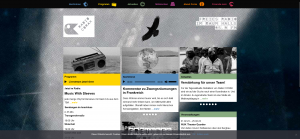Results of an (almost futile) research lasting several months.
by Andreas Peglau[1]
*
Already in the 1920s, Nazi greats such as Alfred Rosenberg had threatened leftist and liberal journalists who attacked the National Socialists with reprisals for the time after a possible Nazi takeover (Rosenberg 1940, pp. 92-112, 119, 401f.). Carl von Ossietzky was among those who actually paid with their lives for their contributions critical of Hitler during the Weimar Republic.
Likewise, Erich Mühsam’s published warnings against fascism probably played a decisive role in his imprisonment and murder in the Oranienburg concentration camp on July 10, 1934.
Ehm Welk was sent to the same concentration camp for three months in 1934 because he had reacted ironically to a Goebbels speech in a newspaper article (Longerich 2010, p. 260). The „National Bolshevist“ Ernst Niekisch’s book Hitler – ein deutsches Verhängnis (Hitler – a German Doom), published in 1932, and other publications critical of the regime earned him an eight-year prison term, from which he was released only in 1945, severely physically damaged (Niekisch 1932; Haffner 1980, p. 255).
The successful conservative author Ernst Wiechert was also imprisoned in 1938, first in the penitentiary and then in the Buchenwald concentration camp, after he had shown solidarity with the politically persecuted Martin Niemöller and refused to participate in the referendum on the annexation of Austria. Wiechert survived the five months of his imprisonment only with the help of fellow prisoners (Barbian 1995, pp. 398-409, 2010b, pp. 405f.; Wiechert 2008). Afterwards, Goebbels made it clear to him personally that he would be returned to the camp „at the slightest occasion,“ but then „for life and with the goal of physical extermination“ (ibid., p. 135f.; cf. Longerich 2010, p. 405).
Jan-Pieter Barbian balances: „[S]henever open criticism of the National Socialist state or the NSDAP was voiced, the Minister of Propaganda did not shy away from the threat of physical violence“ (Barbian 1995, p. 398); as soon as „a writer overstepped the political boundaries set for him by the regime, he risked not only his membership in the Reichsschrifttumskammer and thus his professional existence, but in extreme cases also his life“ (Barbian 2008, p. 20).
But to what extent did this affect psychoanalysis? Which psychoanalytic authors – before and after 1933 – exercised such unequivocal criticism in their publications? Weiterlesen →



